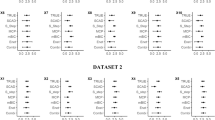Abstract
Group Method of Data Handling (GMDH) is a way with which a system of models self-organize themselves by forming higher-order polynomials and selecting the ones with best power of prediction by certain criterion. This method is helpful when we explore patterns of relationships in the data under investigation. In this paper the author presents a modified version of the GMDH algorithm emphasizing the parsimony of models and the behavior of individual parameter estimates as well as of the whole model, and utilizing the consistency and accuracy of bootstrap estimates. This approach is suitable for most research social scientists conduct. An example, the 1907 Romanian Peasant Rebellion, is used to illustrate how to employ the GMDH algorithm when the research topic has been theory-laden. The findings show that GMDH is an appropriate method that social scientists can utilize in their pursuit of a model that is most parsimonious and theoretically meaningful at the same time. Possible extensions of the modified approach, which in its present form works on linear regression type of models, to logit and probit models are also considered.
Similar content being viewed by others
References
Bock, R. Darrell (1975) Multivariate Statistical Methods in Behavioral Research. New York: McGraw-Hill.
Breiman, Leo and Friedman, Jerome H. (1985) Estimating optimal transformations for multiple regression and correlation. Journal of American Statistical Association 80: 580–598.
Brooks, Hugh A. and Probert, Thomas H. (1984) Let's Ask GMDH What Effect the Environment Has On Fisheries. In Stanley Farlow (ed). Self-Organizing Methods in Modeling: GMDH Type of Algorithms, New York: Marcel Dekker.
Chirot, Daniel and Ragin, Charles (1975) The market, tradition and peasant rebellion: the case of Romania in 1907. American Sociological Review 40: 428–444.
Draper, N.R. and Smith, H. (1981), Applied Regression Analysis. New York: Wiley.
Efron, B. and Tibshirani, R. (1985) Bootstrap methods for standard errors, confidence intervals, and other measures of statistical accuracy. Statistical Science 1(1): 54–77.
Farlow, Stanley J. (1984) The GMDH algorithm. In Stanley Farlow (ed) Self-Organizing Methods in Modeling: GMDH Type of Algorithms. New York: Marcel Dekker.
Ikeda, Saburo, Ochiai, Mikiko and Sawaragi, Yashikazu (1976) Sequential GMDH algorithm and its application to fiver flow prediction. IEEE Transaction on Systems. Man and Cybernetics. SMC-6: 473–479.
Ivakhnenko, A.G. (1970) Heuristic self-organization in problems of engineering cybernetics. Avtomatica 6: 207.
Ivakhnenko, A.G. (1984) Past, present, and future of GMDH. In Stanley Farlow (ed) Self-Organizing Methods in Modeling: GMDH Type of Algorithms. New York: Marcel Dekker.
Kaplan, A. (1964) The Conduct of Inquiry. San Francisco: Chandler.
McCullagh, P. and Nelder, J.A., F.R.S. (1986) Generalized Linear Models. London: Chapman and Hall.
Morgan, James N. and Sonquist, John A. (1962) Problems in the analysis of survey data: and a proposal. Journal of American Statistical Association 58: 415–434.
Mosteller, Frederick, and Tukey, John W. (1977) Data Analysis and Regression. Reading, MA: Addison-Wesley.
Prager, Michael H. (1984) An SAS program for simplified GMDH models. In Stanley Farlow (ed) Self-Organizing Methods in Modeling: GMDH Type of Algorithms. New York: Marcel Dekker.
Scriven, M. (1959) Explanation and prediction in evolutionary theory. Science 130: 477–482.
Sonquist, John A. and Morgan, James N. (1964) The Detection of Interaction Effects. Survey Research Center Monograph No. 35, Institute for Social Research, The University of Michigan, Ann Arbor, MI.
Sonquist, John A., Baker, Elizabeth Lauh and Morgan, James N. (1973) Searching for Structure. Survey Research Center Monograph, Institute for Social Research, The University of Michigan, Ann Arbor, MI.
Stolzenberg, Ross M. (1980) The measurement and decomposition of causal effects in nonlinear and nonadditive models. In Karl F. Schuessler (ed) Sociological Methodology. Chapter 15, pp. 459–488.
Tamura, Hiroyuki and Kondo, Tadashi (1980) Heuristic free group method of data handling algorithm of generating optional partial polynomials with application to air pollution prediction. International Journal of Systems Science 11: 1095–1111.
Vincino, A., Tempo, R., Genesio, R. and Milanese, M. (1987) Optimal error and GMDH predictors. International Journal of Forecasting 3: 313–328.
Author information
Authors and Affiliations
Rights and permissions
About this article
Cite this article
Liao, T.F. A modified GMDH approach for social science research: exploring patterns of relationships in the data. Qual Quant 26, 19–38 (1992). https://doi.org/10.1007/BF00177995
Issue Date:
DOI: https://doi.org/10.1007/BF00177995



